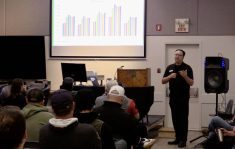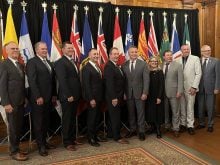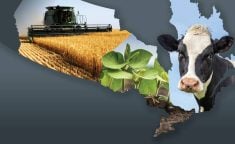In upcoming turbulent times, forecasting the future will lose value, a former Bank of Canada governor told a CropConnect audience. Instead, preparing for multiple scenarios will be key for business risk management.
Economists will be “wallowing around in an incredible amount of uncertainty,” said Stephen Poloz.
Why it matters: Economic volatility will make forward planning harder for farmers.
Read Also

Tie vote derails canola tariff compensation resolution at MCGA
Manitoba Canola Growers Association members were split on whether to push Ottawa for compensation for losses due to Chinese tariffs.
Poloz, an economist, was governor of the Bank of Canada from 2013 to 2020. He was a keynote speaker at CropConnect in Winnipeg on February 15.
There are five “tectonic” forces converging on global economies, Poloz said. These are:
- an aging population,
- technological progress,
- growing income inequality,
- rising debt, and
- climate change and the transition to net zero.
“When they happen to be all gaining strength, which they are right now, they can collide … they can magnify each other,” he said.
Job vacancies are high, which is a sign the economy is “too hot,” Poloz said. However, employment figures may be distorted by the baby boomers, who are retiring in droves.
In the ‘70s, the baby boomers entered the workforce and created a bulge in the labour supply.
“All you’re trying to do is find your way back to a longer-term vision of what normal really is,” Poloz said.
While Canada has traditionally imported labour via immigration, Poloz predicted that it will have to compete with other countries that also need workers.
Companies will need to pay more to get workers and to keep them. This may translate into the return of fulsome benefit and pension plans, Poloz said. As a result, the share of income going to workers will rise, he added.
Today, the share of global income that goes to workers is the lowest in recorded economic history, Poloz said.
This is often a result of technological progress. He said the computer chip and the globalization of supply chains that came created a group of winners, while others lost their jobs.
With such inequality, discontent runs deep. People look to governments to protect them or to create a more certain future for their kids, Poloz said. This can lead to populism, and then to nationalist policies that disrupt trade. Vehement opposition to these policies, meanwhile, leads to polarization.
This has worked out in US and UK politics, countries seeing some of the biggest rise in income inequality, Poloz said.
“I’m trying to help you appreciate that I believe there’s economics underneath it,” he said. “Extreme levels of income inequality have driven political revolutions in the past.”
He said that the world is entering a new industrial revolution — the digitization of everything. This will drive more income inequality, he said.
All economic disturbances have a greater effect when debt — household, government or business — is high, Poloz added. Households and firms are in more debt than ever before in history, he added. Governments are in debt at levels not seen since the Second World War.
“On top of all this, we decided that we must get carbon emissions down to net zero by 2050,” Poloz said.
While there are many ways to get there, he said, “No one is being clear about what path we’ll take to get there.” This adds uncertainty to business decisions.
Poloz said the war in Ukraine and the subsequent energy crisis, has injected some realism into a conversation where naïve absolute statements were common.
Beside these five slow-moving forces, Poloz said geopolitical disturbances like the “cold war” with China add another layer of turbulence. Many experts are predicting widespread deglobalization of supply chains as a result, Poloz said.
He disagreed. “I find wholesale deglobalization quite unlikely just because so much money is at stake.”
His take was that companies will reduce risk by spreading their supply chains among like-minded, low-cost countries. He called this “friendshoring,” not “reshoring” (bringing product home).
In his conclusion, Poloz said that while the ag sector will have to withstand profound structural forces, it has “much to look forward to.” Humanity sits on a three-legged stool, composed of food, water and energy, he said. Rising volatility could create greater demand for Canadian food.
















